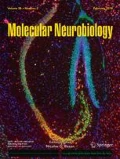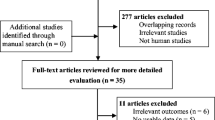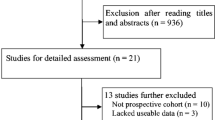Abstract
Sex steroids can positively affect the brain function, and low levels of sex steroids may be associated with worse cognitive function in the elderly men. However, previous studies reported contrary findings on the relationship between testosterone level and risk of Alzheimer’s disease in the elderly men. The objective of this study was to comprehensively assess the relationship between low testosterone level and Alzheimer’s disease risk in the elderly men using a meta-analysis. Only prospective cohort studies assessing the influence of low testosterone level on Alzheimer’s disease risk in elderly men were considered eligible. Relative risks (RRs) with 95 % confidence intervals (95 % CI) were pooled to assess the risk of Alzheimer’s disease in elderly men with low testosterone level. Seven prospective cohort studies with a total of 5251 elderly men and 240 cases of Alzheimer’s disease were included into the meta-analysis. There was moderate degree of heterogeneity among those included studies (I 2 = 47.2 %). Meta-analysis using random effect model showed that low plasma testosterone level was significantly associated with an increased risk of Alzheimer’s disease in elderly men (random RR = 1.48, 95 % CI 1.12–1.96, P = 0.006). Sensitivity analysis by omitting one study by turns showed that there was no obvious change in the pooled risk estimates, and all pooled RRs were statistically significant. This meta-analysis supports that low plasma testosterone level is significantly associated with increased risk of Alzheimer’s disease in the elderly men. Low testosterone level is a risk factor of worse cognitive function in the elderly men.




Similar content being viewed by others
References
Ballard C, Gauthier S, Corbett A, Brayne C, Aarsland D, Jones E (2011) Alzheimer’s disease. Lancet 377(9770):1019–1031
Barnes DE, Yaffe K (2011) The projected effect of risk factor reduction on Alzheimer's disease prevalence. Lancet Neurol 10(9):819–828
Huang Y, Mucke L (2012) Alzheimer mechanisms and therapeutic strategies. Cell 148(6):1204–1222
Lu JX, Qiang W, Yau WM, Schwieters CD, Meredith SC, Tycko R (2013) Molecular structure of beta-amyloid fibrils in Alzheimer’s disease brain tissue. Cell 154(6):1257–1268
Reitz C, Jun G, Naj A, Rajbhandary R, Vardarajan BN, Wang LS, Valladares O, Lin CF et al (2013) Variants in the ATP-binding cassette transporter (ABCA7), apolipoprotein E 4, and the risk of late-onset Alzheimer disease in African Americans. JAMA 309(14):1483–1492
Guerreiro R, Wojtas A, Bras J, Carrasquillo M, Rogaeva E, Majounie E, Cruchaga C, Sassi C et al (2013) TREM2 variants in Alzheimer’s disease. N Engl J Med 368(2):117–127
Liu CC, Kanekiyo T, Xu H, Bu G (2013) Apolipoprotein E and Alzheimer disease: risk, mechanisms and therapy. Nat Rev Neurol 9(2):106–118
Selkoe DJ (2012) Preventing Alzheimer’s disease. Science 337(6101):1488–1492
Borst SE, Yarrow JF, Fernandez C, Conover CF, Ye F, Meuleman JR, Morrow M, Zou B et al (2014) Cognitive effects of testosterone and finasteride administration in older hypogonadal men. Clin Interv Aging 9:1327–1333
Seyedreza P, Alireza MN, Seyedebrahim H (2012) Role of testosterone in memory impairment of Alzheimer disease induced by Streptozotocin in male rats. Daru 20(1):98
Ulubaev A, Lee DM, Purandare N, Pendleton N, Wu FC (2009) Activational effects of sex hormones on cognition in men. Clin Endocrinol (Oxf) 71(5):607–623
Jia J, Kang L, Li S, Geng D, Fan P, Wang L, Cui H (2013) Amelioratory effects of testosterone treatment on cognitive performance deficits induced by soluble Abeta1-42 oligomers injected into the hippocampus. Horm Behav 64(3):477–486
Moffat SD (2005) Effects of testosterone on cognitive and brain aging in elderly men. Ann N Y Acad Sci 1055:80–92
Moffat SD, Resnick SM (2007) Long-term measures of free testosterone predict regional cerebral blood flow patterns in elderly men. Neurobiol Aging 28(6):914–920
Pike CJ, Carroll JC, Rosario ER, Barron AM (2009) Protective actions of sex steroid hormones in Alzheimer’s disease. Front Neuroendocrinol 30(2):239–258
Rosario ER, Carroll J, Pike CJ (2010) Testosterone regulation of Alzheimer-like neuropathology in male 3xTg-AD mice involves both estrogen and androgen pathways. Brain Res 1359:281–290
Moffat SD, Zonderman AB, Metter EJ, Kawas C, Blackman MR, Harman SM, Resnick SM (2004) Free testosterone and risk for Alzheimer disease in older men. Neurology 62(2):188–193
Suravarapu S, Bergstralh EJ, Farmer SA, Knopman DS, Jacobsen SJ, Roberts RO (2006) Dementia and low testosterone and bioavailable testosterone levels in men: possible increased risk. Alzheimer Dis Assoc Disord 20(3):138–140
Muller M, van den Beld AW, Grobbee DE, de Jong FH, Lamberts SW (2009) Sex hormones and cognitive decline in elderly men. Psychoneuroendocrinology 34(1):27–31
Hogervorst E, Matthews FE, Brayne C (2010) Are optimal levels of testosterone associated with better cognitive function in healthy older women and men? Biochim Biophys Acta 1800(10):1145–1152
Mora M, Sanchez L, Serra-Prat M, Palomera E, Blanco J, Aranda G, Falcon I, Cadenas I et al (2012) Hormonal determinants and effect of ER22/23EK glucocorticoid receptor gene polymorphism on health status deterioration in the participants of the Mataro Ageing Study. Age (Dordr) 34(3):553–561
Carcaillon L, Brailly-Tabard S, Ancelin ML, Tzourio C, Foubert-Samier A, Dartigues JF, Guiochon-Mantel A, Scarabin PY (2014) Low testosterone and the risk of dementia in elderly men: impact of age and education. Alzheimers Dement 10(5 Suppl):S306–S314
Wells G, Shea B, O’connell D, Peterson J, Welch V, Losos M, Tugwell P (2014) The Newcastle-Ottawa Scale (NOS) for assessing the quality of nonrandomised studies in meta-analyses. Ottawa Health Research Institute Web site
Higgins JP, Thompson SG, Deeks JJ, Altman DG (2003) Measuring inconsistency in meta-analyses. BMJ 327(7414):557–560
DerSimonian R, Laird N (1986) Meta-analysis in clinical trials. Control Clin Trials 7(3):177–188
Mantel N, Haenszel W (1959) Statistical aspects of the analysis of data from retrospective studies of disease. J Natl Cancer Inst 22(4):719–748
Ponholzer A, Madersbacher S, Rauchenwald M, Jungwirth S, Fischer P, Tragl KH (2009) Serum androgen levels and their association to depression and Alzheimer dementia in a cohort of 75-year-old men over 5 years: results of the VITA study. Int J Impot Res 21(3):187–191
Emmelot-Vonk MH, Verhaar HJ, Nakhai Pour HR, Aleman A, Lock TM, Bosch JL, Grobbee DE, van der Schouw YT (2008) Effect of testosterone supplementation on functional mobility, cognition, and other parameters in older men: a randomized controlled trial. JAMA 299(1):39–52
Simmonds MC, Higgins JP, Stewart LA, Tierney JF, Clarke MJ, Thompson SG (2005) Meta-analysis of individual patient data from randomized trials: a review of methods used in practice. Clin Trials 2(3):209–217
Conflicts of Interest
None declared. There was no funding for the study. The present study was a meta-analysis of relevant studies, and it did not involve human participants and/or animals. In addition, no informed consent was needed in the study.
Author information
Authors and Affiliations
Corresponding authors
Additional information
Wenshan Lv, Na Du, Ying Liu and Xinyi Fan contributed equally to this work.
Rights and permissions
About this article
Cite this article
Lv, W., Du, N., Liu, Y. et al. Low Testosterone Level and Risk of Alzheimer’s Disease in the Elderly Men: a Systematic Review and Meta-Analysis. Mol Neurobiol 53, 2679–2684 (2016). https://doi.org/10.1007/s12035-015-9315-y
Received:
Accepted:
Published:
Issue Date:
DOI: https://doi.org/10.1007/s12035-015-9315-y




